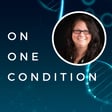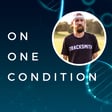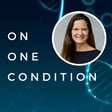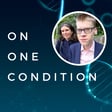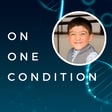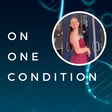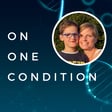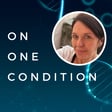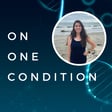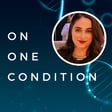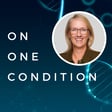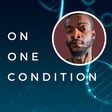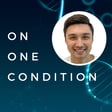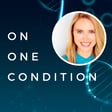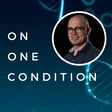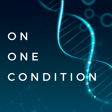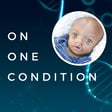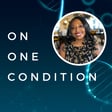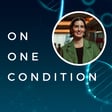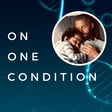Become a Creator today!Start creating today - Share your story with the world!
Start for free
00:00:00
00:00:01

Episode 69: Daniel Price - TSC
Daniel lives with a rare genetic condition, Tuberous Sclerosis Complex (TSC), that results in non-cancerous tumors to grow in various organs, including the brain. From being diagnosed as a child through visible skin signs to managing the complexities of healthcare and advocacy as an adult, Daniel’s journey is marked by courage and community. He opens up about the challenges of transitioning into adulthood, navigating a flawed healthcare system, and carrying the weight of an invisible condition. Daniel is passionate about ensuring adults with TSC are not forgotten and that healthcare becomes a human right, not a privilege.
He chose the song (Everything I do) I do it for you by Bryan Adams.
Transcript
Introduction to Tuberous Sclerosis Complex
00:00:00
Speaker
Hi, I'm Sylvain Bertelot and you're listening to On One Condition, a podcast to raise awareness about health conditions by listening to people who live them every day. My guest today is Daniel Price and we are going to talk about tuberous sclerosis complex, also known as TSC.
00:00:20
Speaker
Hi Daniel, thank you for joining me. How are you doing? Good. Thank you for allowing me to participate in this podcast episode, Shining Light on TSC within the global TSC community, as well as the rare disease community.
00:00:35
Speaker
Well, no, it's an absolute pleasure. and as you know, i love starting with a song. So which song did you choose and why? I really, really like Brian Adams. Everything I do, i do it for you.
00:00:48
Speaker
Mainly because so many people love, within the rare disease community, they they do stay you advocate so much. They're doing so much for one another, for their loved ones. It's like ser survival and wanting to but be able to give more and offer more to their loved ones.
00:01:06
Speaker
and Making sure they can survive in this world. So I guess that song is for everything I do. and do it for you. That's nice. And I like what you say about the rare disease community, because I agree with you that so everyone I talk to in that community really look after each other.
Personal Journey with TSC
00:01:28
Speaker
and And you can tell that nothing is done just for oneself. Everything is done with the community in mind. do you agree with that? Yes, i agree. that I believe that even though I i do advocacy within the TSC community, it's still important too collaborate as well as connect and network with other people within the rare disease community, regardless of just your own rare disease, not only locally, but also globally.
00:01:55
Speaker
Yeah. Well, that's a nice message to start with. So today we're talking about TSC. Would you like to tell us how you discovered that you have TSC?
00:02:09
Speaker
Okay, so my name is Daniel Price. I live in the Seattle, Decoma area. little bit about myself. I am thirty currently 32 years old. i am an inter-country Chinese adoptee to the United States of America. i have one other sibling from China and two from South Korea.
00:02:25
Speaker
Only one in my family that has a rare disease. But i was diagnosed at the age around six or seven through the skin, through a dark light. or You could see...
00:02:37
Speaker
pigments all over my body that are light up. I also was diagnosed through the dermatologist in the late 90s, early 2000s, when technology was evolving. My mom, she said that I was at the dermatologist and she said that I guess the doctor came in with a bunch of books and saying that you need to go see this doctor, this doctor, that doctor, after they diagnosed me and confirmed me with TSC.
00:03:00
Speaker
Why did it start through a dermatologist? What were the signs? i had I guess I had pigments on my face as well other parts of my skin.
00:03:12
Speaker
And those were, the I guess, the signs of TSC. want to say in most cases, but fairly popular where within the the TSC community where you'd see the angiophilomas, which are the benign tumors on the skin, the face. or yeah there They can be from small amounts to all over the nose, all over the face, to this...
00:03:30
Speaker
to other parts of your face, to even to your nails, to other parts of your skin and of your body too. so it just depends on each person's individual situation and case of TSD and how bad it impacts that individual person.
00:03:46
Speaker
Yeah. so you said that you had a list of doctors to to go and see. Why did you have to go and see other doctors? So at the time, I guess when I was about six or seven, i had um I was diagnosed with the seizures at the time. So a lot of people with TSC have seizures.
00:04:04
Speaker
And as of right now, i don't have seizures. But at the time, I was having seizures, having to go to MRIs, having a ah local neurologist in the area and being monitored, having to go to these EEGs, making sure that i had those seizures were not out of control.
00:04:22
Speaker
I was on seizure med at one point. But the med, they were quite not the effective for myself due to i was not myself and I was acting like a different person. Therefore, I was put i was taken off medicine right away.
00:04:41
Speaker
i want to ask you a lot of questions, but I feel like you should explain what TSC is. ah If you don't mind, because that's probably going to answer a lot of my questions.
00:04:53
Speaker
The basic of basic basics. TSC is a genetic-caused disease. it could be like a 50-50 chance. I'm passing it down by genetics. It's also a mutation in the gene gene.
00:05:04
Speaker
genome type of your DNA. It's also a linchpin pinch disease, that meaning that it's linked to other diseases as well and causes such as like the la the lamb disease within women. There's studies with autistic people with TSC. There's sort of's so much more. TSC has shined light onto other parts of not only in the rare disease, but other health conditions that people may have.
00:05:29
Speaker
And how does that present then? you could explain a bit more how it impacts you, please.
Challenges in Healthcare and Education
00:05:37
Speaker
For myself, and growing up, I've been to the K-12 special education program in the United States, having an IEP, which is, an IEP is, for those that don't know, it's an individual IES education.
00:05:49
Speaker
It is a legal document. And this school in the state or government ah school that you go to, I've been through that but public education in the state of Washington in the United States.
00:06:00
Speaker
Then go transitioning into from like middle school to high school and that's when I kind of ran into problems and issues where just having educators and lot of meltdowns and a lot of challenges transitioning into adulthood and trying to get the resources and support I needed for myself.
00:06:18
Speaker
I think those are the big parts. I know that a lot of TSC adults, I think is the most crucial part is and transition into adulthood because you need the most support because we don't want to again, we don't want to lose anyone, but for any such a certain or situation that may happen. Okay. And do you know why it's the case, why it's difficult that transition into adulthood?
00:06:43
Speaker
I think it's the puberty as well as just the so many TSE individuals at that time is just They need that connection.
00:06:54
Speaker
Even in the adulthood area as well, we need more connections and networking and adults showing their voice, giving their voice, making themselves seen and heard, and it may taking them out of that and invisible so situation.
00:07:09
Speaker
and isolation even to a late adult adulthood I feel like that we need to support one another in all areas not just the younger young young generation which is the the babies and the infants and toddlers which is where a lot of research is i don't I won't have anything against that but we mean that's important as well too but what about the adults and the the the adults that are getting to the 50s 60s and 70s that may have TSC we need to support those them as well ah So you're saying that there's more there's much more support in paediatric for TSC than that than if you move to adulthood.
00:07:46
Speaker
There's not as much support. Is that right? for my amount of understanding and how I feel over the amount of years since 2017 within the the TSC community the United States, how I've come across, I'll be honest.
00:08:01
Speaker
I'm going to be transparent as well, but it is true. I feel that there's less support for the adults than there is for children in neurology and children in the younger children's are where a lot of the focus is right now. And I don't have anything against that. That's very important as well.
00:08:20
Speaker
But what happens when those kids grow old, get into adulthood, have a family of their own? Where does that support? yeah Yeah, yeah. And I've heard that the transition from pediatric, which is a certain area of the healthcare system in a way, so transition from pediatric to adult adult and yes it is not necessarily smooth.
00:08:46
Speaker
Yes, it's ah it's one of the hardest ones, to regardless if you even have TSC or other rare disease and conditions or underlying health conditions. It is the hardest part is that getting that support and making sure that everyone is supportive in the way that they need to to survive and to be healthy.
00:09:04
Speaker
be seen and be heard because again, it's those transitions that are one of those things is like make it or break it point where they where a lot of kids and of young young adults transition to adulthood could it could end up on the streets or can end up in a gang or could i end up anywhere else. It's one of make it or break it situations and we don't want to as well as we don't want to lose them as well for their life Yeah.
00:09:29
Speaker
So going back to you growing up, you said you had to go to a special education program. Is that linked to TSC? I assume so, but I don't actually don't know exactly.
00:09:43
Speaker
In high school, I went through a psychologist and psychiatrist. got tested after graduated high school. But I think it's just the cognitive and the delay. i was adopted at the age of ah three.
00:09:57
Speaker
English wasn't my primary language. It was Mandarin Chinese. o say manner are chinese However, English was the language I grew up learning. ah living in the United States.
00:10:08
Speaker
But I don't know if it's the delay because of that or it's just the the delay between and having an underlying health condition with that implies that I would have a disability as well.
00:10:21
Speaker
It's hard to tell. it really is. But I personally would look it to my health condition as well. yeah yeah Is the disability linked to TSC?
00:10:34
Speaker
I would say yes. Okay. On paper, I don't know. One of like the biggest, biggest fears i is is losing my healthcare benefits through my employer. If something had happened to me, I lost my job or the company went out went and bankrupt or whatever, or or they moved to another location, I can't move.
00:10:53
Speaker
It's one of those things where i it's like, Healthcare is the biggest thing for myself. And even even to this day, with the amount of craziness that's going on in the United States with healthcare, care it it is the biggest, biggest, biggest fear for myself.
00:11:08
Speaker
I mean, healthcare, I believe, is for myself i believe and for others, I believe it's a human right to have. Yeah, and i well I don't know exactly how the system works in the US, but I know that it's quite precious to have good health care through your employment.
00:11:27
Speaker
Going back to the seizures, so so you had seizures which were linked to TSC. But you were on medication, but then that didn't work for you. And so do you still have seizures now or not?
00:11:45
Speaker
I am currently, i currently have not had a seizure since then that I know of. Okay. When I was in high school, I do remember my educators at my IEP meeting kind of I don't know if it would be arguing or accommodating or trying to figure out if I had a staring spell, which is considered a seizure. Hmm. Or if I'm just staring out in space or just kind of like drifting off because there's just too much in my head or whatnot.
00:12:14
Speaker
I don't know. i don't know if i had enough if i I was having a seizure or just a moment where I just needed to stop and pause or whatever. yeah That was back in 2012. Yeah.
00:12:26
Speaker
I haven't had any seizures, knock on wood. But that's another fear of myself is having a seizure. and Even though they say that TSC within adults, that if you' you haven't had a seizure, you're youre you'll be okay.
00:12:40
Speaker
But you each person's body is different. And the ah variant of this disease is so complex that no one knows. Not even myself, not the doctors. So it's it's very, very, very, very scary for myself to think about if I get in a car, am I going to have a seizure?
00:12:59
Speaker
Yeah, it's it's dangerous.
Living with TSC: Fears and Self-Care
00:13:01
Speaker
So does TSC impact you in any other way apart from the seizures and the pigment on your on your skin?
00:13:12
Speaker
For myself, yeah, I would say a lot of go go, go, go, go. That's what I noticed a lot within the TSC community. and TSC adults overwhelm themselves with their schedule and try to...
00:13:25
Speaker
look too much within their time frame and they just get exhausted okay i feel that a lot there are times where i have i've i've wanted to melt down and cry there's times when i wanted to scream because it's not only just life but it's just situations that you don't want to deal with in life Even though TSC is part of it, it's just one of the things we had to face within everyday life. Yeah.
00:13:52
Speaker
I mean, the other day I wanted to scream because there was so much going on in my head. There was so much going on at work. There was so much going on just everywhere. There are times that we need to step back, slow down, and also take care of ourselves.
00:14:10
Speaker
Mm-hmm. How do you slow down? Try to take a naps. Quiet time too. sent Some soft music. And also go walking if if possible.
00:14:23
Speaker
If possible, be in nature. and know that a lot of people, walking is very important. But yeah, sometimes it's hard for people's schedules too, especially if you commute far for work and or other obligations that you may have within your life.
00:14:41
Speaker
So it's important to find those times and make sure that we are taking care ourselves. That's the most important thing. Do you have a flexible work that allows you to take time for yourself?
00:14:54
Speaker
I would say so, yes. I'm able to swap and trade shifts, most likely in a last minute situation. so yeah, I would have a ah most flexible work and schedule if needed.
00:15:09
Speaker
Yeah. Yeah, that's important too. you're You're saying something very, very important, not only for anyone in the rare disease community, but just in general, you need to take time for yourself. and And some people can go and don't necessarily need that.
00:15:29
Speaker
And some people thrive from being busy all the time, but others don't. And and we need flexibility for for workers, really.
00:15:40
Speaker
So going back to what TSC does to your body, where in your body does it present itself? With inside myself, I would say that they are the benign tumors that are in all my kidneys.
00:15:55
Speaker
About 90% of people with TSC have AMLs on their kidneys or some sort of benign tumor on their kidneys or other parts of their their organs. Mine are currently on my right side, and I have think guy I have one on my left side.
00:16:09
Speaker
i also have nodules within my brain and and on my lungs, like little dots just all over my brain and lungs. and Okay. Do they grow or can you heal them? The AMLs do grow. i i've been on medicine since 2018, I believe, and it should help shrink the badae tumors. Okay. They were growing within five centimeters within one year, which is a lot.
00:16:38
Speaker
Yeah. It was very concerning to the doctor and the medicine has helped a tremendous amount, I would say. i don't know actually. the measurements of that, but it has helped a lot. I know others but within the TSC community have helped shrink to even just smaller than a golf size golf ball size.
00:16:55
Speaker
But it is it's a case-by-case scenario for each individual with TSC. It's also just gaining that access within the United States of the healthcare system and getting that access to medical.
00:17:09
Speaker
Okay.
Navigating the Healthcare System
00:17:10
Speaker
Do they risk turning into tumors? and Not that I know of. No. It is just, they're just there. and Back in the, I'd say the the 80s and 90s, they were going to take out kidneys and stuff like that and take out the organs and all this other things.
00:17:28
Speaker
Yeah. That's the last thing you want to do nowadays you because you don't want to chop up an organ and you want to shrink it down as much as you can because the last, root last last, last, last resort is to remove the benign tumors.
00:17:41
Speaker
Okay. So the medication you're on, is it specific for those benign tumors? ah Specific for TSC or is it something that is used more generally? It is. I guess it's a prescribed medicine.
00:17:58
Speaker
I'm on a generic, generic brand. Now, very very low dose. I take it orally daily. It should help with just overall tumors within my body, ah well as skin manifestations.
00:18:11
Speaker
It's a lifelong medicine that i have to take for the rest of my life. Many people with TSC have to take, if they're on this drug, they'll have to take not only that one, but others, I'm sure, quite, will have to take lifelong medicine to help with their TSC situations and cases.
00:18:27
Speaker
Okay. And is it difficult to get the medicine at all? Because you were talking about needing the the healthcare that you get through work. So is the medicine something that you get easily?
00:18:40
Speaker
For many people within that are listening, is and the US healthcare system is quite very, very, very complex. It is an insurance-based country for healthcare and quite many other things.
00:18:52
Speaker
However, it's based on your insurance plan and your benefits and then what's covered and what's not covered and what they'll cover. And I'll say the last couple of months, well just in this year, 2025, 2020,
00:19:07
Speaker
five has been quite a up and down, running in circles, just getting help cover the remaining copay i balance and whatnot. I mean, even if it got approved then you if it for a $15,000 medicine, then it got a approved for almost 90% to 95%, but you're still, what, $1,500? So we had to pay for a 28-day supply of medicine?
00:19:28
Speaker
That's still a lot of money. It's just insane. and i mean Yeah, why do you need to get it approved? within the United States, they have a prior authorization.
00:19:39
Speaker
it has to be approved by the prior authorization within the insurance company, as well as the prior authorization within the establishment of the provider's organization.
00:19:51
Speaker
So making sure that it's it's getting covered from both ends and making sure that this is the right medicine that we can we will we want to approve so that okay this person is not getting the wrong medicine, but also...
00:20:06
Speaker
making sure that we cover it and so on. Mm-hmm. Or is it something that you risk losing then? Is there one one day could they go, no we don't approve this medicine for you?
00:20:18
Speaker
Oh, yeah. it's i I was on manufacturer company name brand, and they stopped covering for the financial assistance program, okay which i was very kind of surprised.
00:20:36
Speaker
I've had really, really great experience with them. I was very, very pleasant to the amount of dedication they had for their for their customers and their their patients.
00:20:48
Speaker
And just to hear that they stopped it, That surprised me. And to go through a different route and navigation to find and get access to my healthcare medicines that I need to survive for my TSC.
00:21:02
Speaker
So in that case, is that when you have to move to a generic form of of the medicine? Yes, a generic one, which is the more lower cost. It's basically the same medication, same formula, just a different label.
00:21:17
Speaker
It's sad to think that so many people within... the TSC community, but as I'm sure as well as in the rare disease community within the United States has to go through that situation as well within their assurance, getting it approved, having to wait X amount of days, X amount of weeks, X amount of months just to hear back and have to call, make phone calls.
00:21:41
Speaker
Yeah, it's like around circles. yeah Yeah, can imagine. So when you had to move to the generic treatment, was it something that was suggested by the insurance or did you have to go back to your doctors and ask what you can have been going back and forth between different insurances through...
00:22:03
Speaker
over the many years with my employer and what's covered and what's not covered. So I've gone back and forth on name brand and generic. It's kind of a headache. I guess it is the business at the same time.
00:22:16
Speaker
But then again, I do, when I have when i have issues with a name brand, I just call a doc. I have to i have to call or get in contact with the provider and like, I need to go to the generic brand because it's not covered.
00:22:28
Speaker
Or the generic brand and it's not covered, I need to go to this one. There's certain different avenues, but it's finding those, finding the ways to get around the wall or the the barriers and getting the resources to go around those barriers to help me get those medicines.
00:22:45
Speaker
Yeah. And I imagine the number of people who may not have the the willingness to do that because it can be difficult and it takes time. And maybe some people will go, well, actually, I can't do it.
00:23:04
Speaker
and And in that case, you lose your medication. When i was talking to one of the other TSC representatives in Australia, I actually wanted to know how much did they pay for the drug that I was trying to get.
00:23:18
Speaker
Because the United States is an insurance-based country, Australia is not insurance-based, it's governmentally funded, and so therefore it's very significantly less. 50 to 60 Australian dollars compared to the 12,000 to $16,000, depending on the strength, the size, as well as the state. And then the the pharmacy you go to as well. Really?
00:23:44
Speaker
It's, it's ridiculously expensive. I was amazed and shocked to see, to, to think that, i could If I was living in Australia, I could get my medicine at that price, and it goes through the it goes through the government.
00:24:00
Speaker
I hope one day that the human race will understand that medicine and healthcare is a human right, not a profit. I love what you're saying.
00:24:12
Speaker
But now I'm thinking everything that would have to change to for it to happen is a big task. Oh, yes, I know. One one day, I hope.
00:24:23
Speaker
Yeah,
Advocacy and Community Engagement
00:24:24
Speaker
yeah. yeah ah So I'd like to switch to advocacy. why Why is it important for you to share about ah TSC and to be part of the rare disease community?
00:24:36
Speaker
It shines light to the rare disease. Also, for those that can't give voices within the TSC community, there's quite a number of TSC adults that would love to, but there's it's about accessibility.
00:24:52
Speaker
A lot of them can't fly due to their health commission or financial situations or other situations that are going on within their life.
00:25:03
Speaker
I know that technology has helped a significant amount. However, it's very important to be able to be more inclusive and and be more aware for others and seen.
00:25:17
Speaker
so that other people can share their voices. But and that for those that are not ready, I mean, this would be an area to be able to give the voice and give those that light so that those that are not ready or are not able to give a seat at a table that this will be area to shine light on that and then it's important within the rare disease community and to make sure that all our voices are heard seen and are visible regardless of what rare disease you may have within the rare disease community globally yeah yeah yeah is the tsc community big
00:25:58
Speaker
Within the United States, it's fairly big. Yes, I would say it's one of the biggest organizations, the TSC Alliance. and I've also interacted with the TSC organization in Australia, New Zealand, okay and also in the United Kingdom. There's an association there. And then also later in August, I will be participating in an event within the association in China, mainland China.
00:26:28
Speaker
Wow. So do you fly there or is it remote? It will be in-person event. Okay. and it'll be my first time being at TSC event in my home country, country of origin, which will be quite different.
00:26:45
Speaker
yeah I've been in contact with the organization for about almost two years, I would say, just for about a year and a half of two years. The timing wasn't hasn't been perfect. I've been invited couple times.
00:26:58
Speaker
One event was focused more on people that have skills in the medical industry, medical industry But it's all in Mandarin. There is going to be no English. Okay. And I'm not fluent in Mandarin, but also I'm not fluent in medical terms either.
00:27:15
Speaker
yeah also trying to and translate medical terms into english from Chinese to English. Yeah. That would be very hard. yeah Yeah, I can imagine. How do you engage with the TSC community?
00:27:29
Speaker
I think going to events, showing up, being seen, being visible is very important. Virtually in person, being active on social media, making yourself seen, heard again, and connecting and networking with so many people is very important.
00:27:48
Speaker
I lot of people say that, oh, I can't do it because I can't go to that event. Well, there's still social media. There's still other ways that you can connect with people and network within the rare disease, not only in the rare disease, but TSC and TSC and rare disease community. It's good that there are events like this because it really helps connect. And I imagine also talk to people who have similar experience as you must be very important.
00:28:18
Speaker
Right. Well, I have one last question for you, Daniel, which I love asking everyone.
Finding Peace and Reflection
00:28:24
Speaker
What's your happy place? The place where you feel at peace?
00:28:29
Speaker
That's a hard question. A happy place. I like the ocean. i think a lot. Ocean, nature. the outdoors, hiking, it gets your mind away from but hustle bustle.
00:28:44
Speaker
i do like the city a lot, but I do also like my privacy and my space. but Being out in the wilderness, being with nature, it just calms calms me down.
00:28:56
Speaker
Being able to think, process, slow the body, the rhythm, being able to be more engaged with yourself is very important.
00:29:07
Speaker
Yeah, that's a perfect way to to finish. And ah it goes back to what you were saying about being able to find time for yourself. So i love that.
00:29:18
Speaker
Well, thanks a lot, Daniel. It's been extremely interesting. You've... talked about like the insurance aspect, which I wasn't necessarily aware of because it changes country to country.
00:29:30
Speaker
And listening to you, it feels like there could be a thin thread that almost could break in in the insurance system for you. or Or at least like you feel that that there's a risk. So that's I didn't realize that. but It's not a good situation to be in.
00:29:46
Speaker
Thanks a lot for you for your time. I really appreciate it Thank you.
